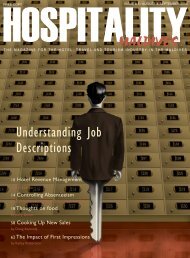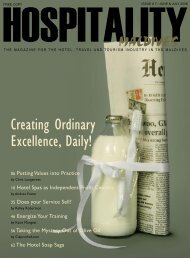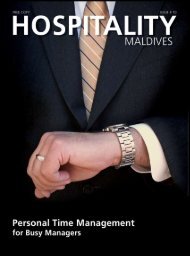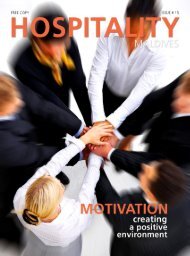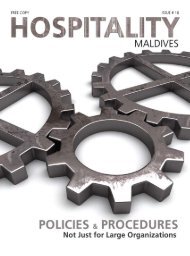Don't Let Your Systems Drive Your Customers Crazy! - Hospitality ...
Don't Let Your Systems Drive Your Customers Crazy! - Hospitality ...
Don't Let Your Systems Drive Your Customers Crazy! - Hospitality ...
Create successful ePaper yourself
Turn your PDF publications into a flip-book with our unique Google optimized e-Paper software.
HUMAN RESOURCES<br />
Bringing Out the Best in People [Part 1]<br />
by Chris Longstreet, CHA<br />
Recently, we moved our SHM office, and, during the process<br />
I came across a book I read in college that I promised<br />
I would never throw away or get rid of. The book is entitled<br />
Bringing Out the Best in People:<br />
How to Enjoy Helping Others Excel by Dr. Alan Loy Mc-<br />
Ginnis.<br />
“Have you ever wondered at the way certain people bring out<br />
the best in others? They seem to know how to get an extra effort<br />
from the people they lead. We have all known them – some are<br />
teachers or heads of companies, others are baseball managers or<br />
mothers. Frequently without good looks or extraordinary intelligence,<br />
they seem to possess a knack for inspiring people. And<br />
this remarkable skill at the art of motivation makes them highly<br />
successful at almost everything they do.”<br />
Look back over your career. Who motivated you? Who<br />
brought out the best in you? Which managers, which leaders,<br />
seemed to bring out the best in the people they served?<br />
In his book, Dr. McGinnis outlines twelve rules for bringing<br />
out the best in people. These principles can be applied to any<br />
team you lead: the front desk, the sales department, housekeeping,<br />
servers, the kitchen, or even the management team of your<br />
hotel or restaurant.<br />
These skills are valuable in creating a motivational environment<br />
where your employees want to work and feel the can contribute<br />
to the success of your organization.<br />
In part one of this three-part article, we look at the first four<br />
rules and how we can apply them to the environments in which<br />
we work.<br />
Rule 1 - Expect The Best From<br />
the People You Lead<br />
In the musical My Fair Lady, Eliza Doolittle<br />
is transformed from an uneducated<br />
woman to a sophisticated lady. One of the<br />
famous lines of the play, Goethe makes<br />
a bold statement about human nature:<br />
“Treat a man as he appears to be and you<br />
make him worse. But treat a man as if he<br />
already were what he potentially could be,<br />
and you make him what he should be.”<br />
Do you expect the best from the people<br />
you lead? Or do you settle for what they give you and find<br />
other solutions to improving the service provided to your guests<br />
and patrons?<br />
In the hospitality classes I teach, we discuss motivational theories<br />
and strategies. One theory, the Pygmalion Effect, states that<br />
the expectations your employees have of themselves determines<br />
how they will perform. If we expect great things as managers,<br />
great things will happen. If we accept and expect average performance,<br />
average performance is what we will get. By emphasizing<br />
the positives and what employees can do, employees will<br />
believe in themselves and perform at higher levels. To do this, we<br />
must communicate our belief in their skills and abilities. Setting<br />
high performance and quality standards and communicating to<br />
your team so that they can achieve them will yield positive results.<br />
Housekeepers will clean rooms to the cleanliness levels you set.<br />
Servers will up-sell menu items because you set the standards<br />
and expectations high. Positive expectations can yield positive results.<br />
Unfortunately, when people become managers or leaders<br />
within an organization, they immediately feel like a police officer<br />
and must watch every employee move to make sure standards are<br />
being met. This watchdog role is looking for failure and creates<br />
an adversarial relationship between management and line employees.<br />
Good managers, on the other hand, look for the strengths in<br />
employees and discover ways to encourage the skills and abilities<br />
of each person. If we expect good things from our employees, in<br />
most cases they take great strides in meeting those expectations.<br />
If we expect the worse, they will meet those expectations and<br />
continue to disappoint us with their performance.<br />
Rule 2 – Make a Thorough Study of the Other<br />
Person’s Needs<br />
One of the more enjoyable parts of teaching at the college level<br />
is working with students and helping them discover what excites<br />
them about the hospitality industry. When a student makes a true<br />
connection with their passion for what they want to do, it is easy<br />
to push them to succeed. Their interest level is higher when studying<br />
as they develop a passion for what they are studying. The fear<br />
of pleasing other people, like parents, disappears and the passion<br />
for discovering success becomes so clearly apparent. Whether it<br />
be working for a baseball park in the minor leagues, becoming a<br />
leader in the housekeeping department, or working toward a vision<br />
of owning a restaurant or club, discovering what a student<br />
wants makes the educational experience far more motivating for<br />
both the student and the instructor.<br />
“ The fear of pleasing other people, like<br />
parents, disappears and the passion for<br />
discovering success becomes so clearly<br />
apparent. ”<br />
McGinnis says, “Too many leaders ignore this essential early<br />
step.<br />
They see motivation as mere hype – slapping people on the<br />
back and giving rah-rah pep talks. But it is more than hype. A good<br />
motivational plan must be as carefully fitted as a designer dress.<br />
We must ask a lot of questions about where people have been<br />
and where they are going, what they believe, what are their sore<br />
spots, what they love and what they hate. In other words, we must<br />
make an inquiry into people’s present need systems.”Motivation is<br />
therefore situational. It is unique to each person. Sarah, a server,<br />
has a different set of needs than Darren, the line cook. Tamyra,<br />
the housekeeper, is motivated differently than Gerard, the maintenance<br />
engineer. What motivates you is different than what motivates<br />
the employees you lead or the person you report to.<br />
HOSPITALITY MALDIVES OCTOBER/NOVEMBER 2006 33




